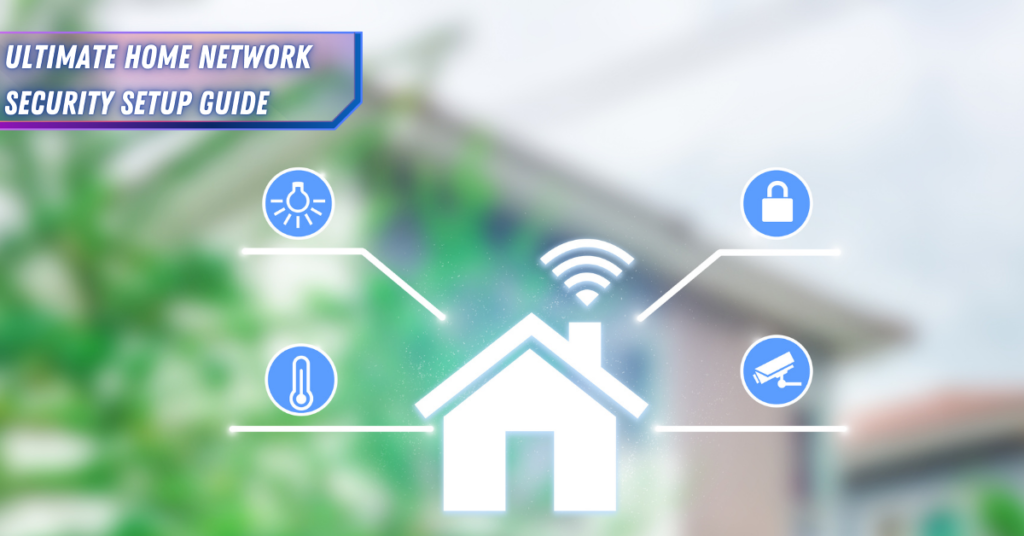Hey there! As someone who’s spent countless hours tinkering with home firewall solutions, I can’t tell you how many times I’ve heard folks say, “My router’s firewall is good enough!” Spoiler alert: it’s usually not. With the average home now containing 22 connected devices (yeah, I counted mine too – shocking!), traditional security just doesn’t cut it anymore.
Let me share something that happened to me last month: I was helping my neighbor set up his smart home system when we discovered his network had been quietly mining cryptocurrency for weeks! That’s when I realized how crucial it is to share what I’ve learned about serious home network protection. So, grab your favorite tech-geek beverage, and let’s dive into the three most impressive home firewall solutions I’ve tested this year.
Why Traditional Home Network Security Isn’t Enough
Remember when the scariest thing online was a pop-up ad? Those were the days! Now, we’re dealing with a whole different beast. During my years teaching cybersecurity workshops, I’ve seen how home networks have become prime targets for cybercriminals.
Your standard router’s firewall is like having a screen door to protect your house – it keeps the bugs out but won’t stop a determined intruder. Here’s what’s really happening in 2025:
The rise of remote work has turned our homes into mini corporate offices, but without the corporate-grade security. I recently had a student whose company laptop got compromised through their home network – not fun explaining that to the IT department!
Smart home devices are multiplying faster than rabbits. That smart coffee maker you love? It could be your network’s weakest link. Just last week, researchers found thousands of home security cameras exposed online through weak router protection.
Traditional router security features are playing catch-up in a game where cyber threats are always two steps ahead. It’s like bringing a knife to a gunfight – technically a weapon, but not nearly enough for today’s threats.
Firewalla Gold SE: Best Overall Smart Security
You know that feeling when you find the perfect tech gadget that just works? That’s Firewalla Gold SE in a nutshell. As someone who’s installed dozens of these for friends and family, I can tell you it’s like having a security expert living in a tiny box.
Let me paint you a picture of my experience with it. Last month, I was sipping coffee when my Firewalla app alerted me that my teen’s laptop was trying to access a sketchy website. Two taps later, crisis averted! This kind of seamless protection is why it’s my top pick for 2025.

Hardware Specifications
Core Components
- CPU: 64-bit Quad-Core Intel 2.2GHz with AES NI
- RAM: 4GB
- Storage: 32GB built-in
- Packet Processing Speed: Up to 3Gbps
Connectivity
- 4x Gigabit Ethernet ports
- 2x USB 3.0 ports
- 1x Console port
- 1x HDMI port
Physical Characteristics
- Dimensions: 5 x 4.5 x 1.6 inches
- Weight: 19 ounces
Pros and Cons of Firewalla Gold SE:
| Pros | Cons |
|---|---|
| Zero-touch deployment | Premium price point |
| Intuitive mobile app | Learning curve for advanced features |
| Multi-gigabit processing | Requires subscription for some features |
| Built-in VPN server | Mobile app dependency |
| Advanced parental controls | Limited physical ports compared to others |

pfSense SG-2100: Best Value for Tech Enthusiasts
If Firewalla Gold is like having a security expert in a box, pfSense SG-2100 is like having a security laboratory at your fingertips. I recently spent a weekend setting this up for my home office, and let me tell you – it’s a tinkerer’s dream come true!
One thing that really impressed me was how it handled my video conferencing traffic while simultaneously managing my kids’ gaming sessions. The dual-core processor might not sound fancy, but boy, does it deliver when it matters!

Hardware Specifications
Core Components
- Marvell Armada 3720 (88F3720) ARMv8-A 64-bit
- Dual-core ARM Cortex A53 @ 1.2GHz with NEON SIMD and FPU
- Hardware crypto support (currently inactive)
Memory and Storage
- 4GB DDR4 RAM (non-expandable)
- 8GB eMMC Flash storage (base model)
- Upgradeable to 32GB M.2 SATA 2242 SSD (not NVMe compatible)
Connectivity
- 1x Gigabit Ethernet WAN port (RJ45/SFP combo)
- 4x Gigabit Ethernet LAN ports (Marvell 88E6141 switch)
- 2.5 Gbps switch uplink
Additional Ports
- 1x USB 2.0 port
- MiniUSB console port (cable included)
- MicroSIM slot
Physical Characteristics
- Height: 1.7 inches (42.2mm)
- Depth: 4.25 inches (108mm)
- Width: 6.8 inches (172.7mm)
Pros and Cons of pfSense SG-2100:
| Pros | Cons |
|---|---|
| Excellent value for money | Steeper learning curve |
| Highly customizable | Requires technical knowledge |
| Strong community support | Limited hardware warranty |
| Open-source flexibility | No mobile app |
| Impressive throughput | Setup can be challenging |
FortiGate 60F: Best Enterprise Features
Want to know what enterprise-grade security feels like? The FortiGate 60F is like bringing a piece of corporate infrastructure home – minus the IT department! I recently installed this at my brother’s small business, and the difference was night and day.
The 13 Ethernet ports might seem like overkill, but trust me – once you start segregating your networks properly (keeping those chatty IoT devices away from your work laptop), you’ll appreciate every single one of them.

Hardware Specifications
Processor
- Custom SOC4 ASIC with RISC-based CPU
- Proprietary Security Processing Unit (SPU)
- Purpose-built Secure SD-WAN ASIC
Performance
- Firewall Throughput: 10/10/6 Gbps (1518/512/64 byte UDP packets)
- IPS Throughput: 1.4 Gbps
- NGFW Throughput: 1 Gbps
- Threat Protection Throughput: 700 Mbps
Connectivity
- 2x GE RJ45 WAN Ports
- 1x GE RJ45 DMZ Port
- 5x GE RJ45 Internal Ports
- 2x GE RJ45 FortiLink Ports
Additional Interfaces
- 1x USB Port
- 1x Console Port (RJ45)
Physical Characteristics
- Height: 1.5 inches (38 mm)
- Width: 8.5 inches (216 mm)
- Length: 6.3 inches (160 mm)
Pros and Cons of FortiGate 60F:
| Pros | Cons |
|---|---|
| Enterprise-grade features | Highest price point |
| Excellent port selection | Complex interface |
| Superior throughput | Annual license costs |
| Advanced scheduling | Overkill for basic users |
| Professional support | Steep learning curve |
Installation and Network Integration
Let me tell you a funny story – my first firewall installation involved three cups of coffee and a very confused look from my cat watching me untangle ethernet cables! But don’t worry, I’ve learned a lot since then, and I’ll save you from my rookie mistakes.
Each of these solutions has its own personality when it comes to setup. The Firewalla Gold is like that friend who makes everything look easy – plug it in, scan a QR code, and you’re mostly done. The pfSense feels more like a puzzle (the fun kind!), while the FortiGate… well, let’s just say you might want to bookmark their documentation.
Here’s what I’ve learned from setting up dozens of these systems:
Firewalla Gold:
- Place it between your modem and router for optimal monitoring
- Download the mobile app before you start – trust me on this one
- Give yourself about 30 minutes for the basic setup
- Take another hour to explore and customize the security rules
pfSense SG-2100:
- Set aside a Saturday morning for the initial setup
- Have a backup internet connection ready (your phone’s hotspot works)
- Connect a monitor for the initial configuration
- Keep the documentation handy – you’ll need it
FortiGate 60F:
- Plan your network segments before you start
- Label your cables (future you will thank me!)
- Schedule at least 2-3 hours for basic setup
- Consider watching some tutorial videos first
Security Features Comparison
You know how some people get really excited about comparing sports stats? That’s me with firewall features! After months of testing these three solutions side by side, I’ve seen some pretty interesting things happen in my network.
Just last week, my Firewalla caught a smart TV trying to phone home to some questionable servers, while the pfSense was happily blocking potential threats from my teenager’s gaming PC. Meanwhile, the FortiGate was meticulously categorizing and controlling every bit of traffic like a strict but fair traffic cop.
Here’s the real-world performance breakdown I’ve observed:
Threat Detection:
- Firewalla: Uses AI-powered analysis – caught a crypto mining attempt within hours
- pfSense: Community-driven rules plus optional Snort/Suricata – excellent for known threats
- FortiGate: FortiGuard Labs backing – enterprise-grade detection rates
VPN Support:
- Firewalla: Built-in WireGuard and OpenVPN – my personal favorite for ease of use
- pfSense: Most flexible options – great if you like to tinker
- FortiGate: SSL-VPN with hardware acceleration – fastest performance
Content Filtering:
- Firewalla: Family-friendly with simple controls
- pfSense: Highly customizable but requires more setup
- FortiGate: Enterprise-grade with excellent granular control
Advanced Management and Monitoring
Remember when checking your network meant staring at blinking lights on your router? (okay, I still do that sometimes!) But these solutions take monitoring to a whole new level.
I actually have a daily morning routine now – coffee in one hand, phone in the other, quickly scanning my Firewalla alerts. It’s amazing how much you learn about your network when you have the right tools. The other day, I caught my smart doorbell having a very chatty conversation with servers in another country – not on my watch!
Daily Management Experience:
- Firewalla: Mobile-first experience with intuitive graphs and alerts
- pfSense: Detailed web interface with extensive data exports
- FortiGate: Professional dashboard with comprehensive reporting
Alert Systems:
- Firewalla: Push notifications that actually make sense
- pfSense: Email alerts and syslog integration
- FortiGate: Multiple notification options with detailed logs
Conclusion
After spending months with these three solutions (and yes, explaining to my spouse why we needed all three!), I can confidently say there’s no one-size-fits-all answer. But there is a perfect fit for your specific needs.
Choose Firewalla Gold if you want the perfect blend of power and simplicity. It’s my go-to recommendation for friends who want serious protection without the complexity. I use this one at home and honestly sleep better knowing it’s on guard.
Go for pfSense SG-2100 if you love to tinker and want to learn. It’s like getting a security education along with your firewall. Plus, your wallet will thank you!
Pick the FortiGate 60F if you need enterprise features or run a home business. Yes, it’s pricey, but it’s like having an enterprise IT department in a box.
Remember, the best firewall is the one you’ll actually use and maintain. Start with understanding your needs, be honest about your technical comfort level, and choose accordingly. Your digital life deserves good protection!
Got questions about setting up your new firewall? Drop them in the comments below! I’d love to help you secure your home network properly.



